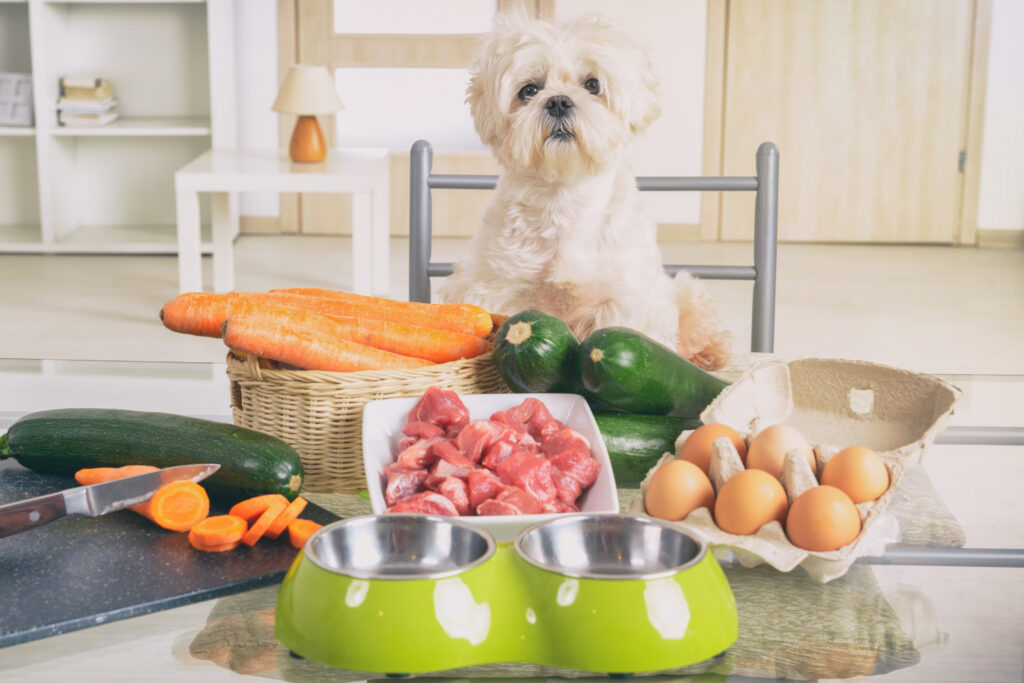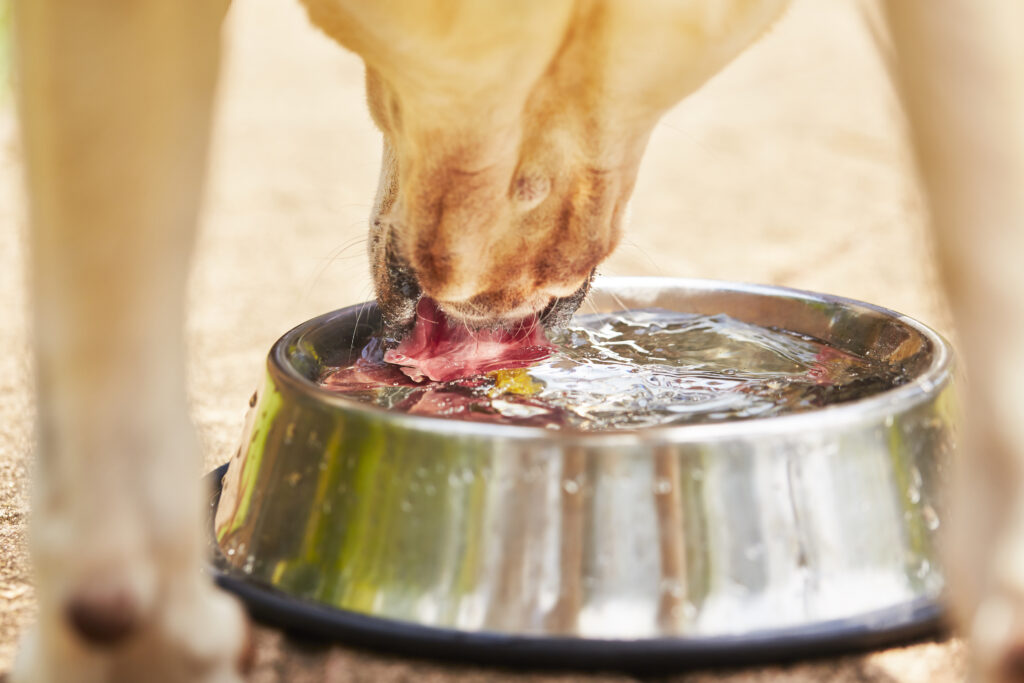
Raise your hand if you are overwhelmed by what to feed your new puppy or dog. 🙋♀️ Here are some pet nutrition tips I found helpful and want to share with you. When it comes to our dogs, we want the best for them, and a significant part of their well-being is tied directly to what they eat. Exploring pet nutrition can feel like you are going down a rabbit hole with the many options available today. Each has benefits and possible pitfalls, from commercial pet foods to home-cooked meals.
Understanding Your Dog’s Nutritional Needs
Our dogs need a well-rounded diet of proteins, healthy fats, carbohydrates, vitamins, and essential minerals, just like us. Specific needs can vary significantly between breeds, ages, and health conditions. For instance, dogs are omnivores and can thrive on various foods, whereas cats are true carnivores and need a diet heavily based on meat.
Proteins are Essential
Proteins are essential for growth, muscle repair, and overall maintenance of your dog’s body. Animal-based proteins (like chicken, beef, and fish) are generally preferred because they contain all the essential amino acids they need. While plant-based proteins can supplement a diet, they should not be the sole source of protein, especially for cats.
Fats Concentrated Energy
Fats offer a concentrated energy source and are crucial for absorbing specific vitamins (A, D, E, and K). They also support skin and coat health, making your pet’s fur shiny and soft. Healthy fats are fish oil, flaxseed oil, and chicken fat.
Carbohydrates are a Source of Fiber
While not strictly necessary, carbohydrates can be a valuable energy source and provide the fiber needed to aid digestion. Grains, vegetables, and legumes are common carbohydrate sources in pet food.
Vitamins and Minerals: The Micronutrients
Vitamins and minerals are required in small quantities but are crucial for various bodily functions, including bone development, nerve function, and immune response. Commercial pet foods are typically fortified with these nutrients to ensure your pet’s diet is complete and balanced.
Commercial Pet Foods: What to Look For
Commercial pet foods are famous for their convenience and the assurance that they meet the nutritional standards of organizations like the Association of American Feed Control Officials (AAFCO).
Choosing the Right Brand: Read the Labels
When choosing dog food, look for brands that list a specific meat source as the first ingredient (e.g., chicken, lamb, or salmon). Avoid foods with vague labels like “meat by-products” or “animal fat.” Also, be wary of foods with high fillers, such as corn, soy, and wheat, which offer little nutritional value.
Dog Food Labels
Pet food labels can be tricky to decipher, but they contain crucial details about what you’re feeding. The guaranteed analysis on the label indicates the minimum or maximum levels of protein, fat, fiber, and moisture in the food. The ingredient list, arranged by weight, will give you an idea of what is most prevalent in the food.

Specialty Diets
Specialty diets, such as hypoallergenic, grain-free options and foods designed for weight management, are available for dogs with specific health issues. Always consult your veterinarian before switching your pet to a specialty diet.
Homemade Diets: The Pros and Cons
Homemade diets give you more control over what your dog eats. They can be customized to suit your dog’s specific needs and are an option for pets with allergies or sensitivities. Preparing a nutritionally balanced homemade diet requires thoroughly understanding your pet’s nutritional needs. Your vet will guide you if you would like to go this route.
Raw Diets
Raw diets, also known as BARF (Biologically Appropriate Raw Food), consist of raw meat, bones, fruits, and vegetables. Some argue they are more natural and healthier, mimicking what pets eat in the wild. Raw diets come with certain risks, including bacterial contamination and the possibility of an unbalanced diet. It’s crucial to consult with a veterinarian or a pet nutritionist if you’re considering a raw diet for your dog. For example, after my dog’s annual checkup, I was encouraged to feed her a non-raw diet due to potential heart issues in the future. Therefore, we switched to the vet’s recommended food. This is not a one-size-fits-all scenario. Therefore, asking what is best for your dog is essential.
Cooked Diets
Cooked diets involve preparing meals for your pet using lean meats, vegetables, and grains. While cooking reduces the risk of bacterial contamination, a balanced diet is essential, which may require supplementation. Again, I scream it from the mountain tops (not at you, just in general) always ask your vet what is best for your pup.
The Importance of Hydration
Water is often overlooked in pet nutrition but is as essential as food. Ensure your dog has fresh water daily, and consider wet food options if it needs to drink more on its own.

Supplements: Are They Necessary?
A well-balanced diet should provide all the nutrients your dog needs. However, some dogs, especially those with specific health conditions, may benefit from supplements. Check with your vet before giving these to your dog.
Common supplements include:
- Fish Oil
- Glucosamine and Chondroitin
- Probiotics
Transitioning to a New Diet
If you’re considering changing your dog’s diet, it’s essential to do so gradually to avoid gastrointestinal upset. This is a gradual process: Mix the new food in small amounts into the current food, increasing the new food’s proportion for a week or two.
Nutritional Deficiency Signs
Possible nutritional deficiency signs are:
- Poor coat condition: Dull, brittle, or thinning fur.
- Low energy levels: Lethargy or lack of interest in playtime.
- Weight loss: Losing weight despite a normal appetite.
- Digestive issues: Diarrhea, vomiting, or excessive flatulence.
If you notice these signs, consult your veterinarian to adjust your pet’s diet.
Encouraging Healthy Eating Habits
Be mindful of portion sizes based on your pet’s weight, age, and activity level. Treats should be given in moderation. My pup will vomit if given too many treats. I give her small freezed dried liver treats (one ingredient). Two years later and still her favorite treat, never gets bored of them.
Your Dog’s Optimal Wellness Journey
Dog nutrition is a complex but rewarding aspect of pet ownership. Understanding your dog’s nutritional needs and making informed choices can significantly enhance their quality of life. Whether you opt for commercial pet food, a homemade diet, or a combination of both, the key is ensuring your pet’s diet is balanced, complete, and tailored to their needs. Cheers to a happy and healthy dog, pet parents!